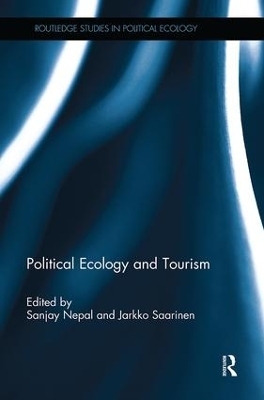
Political Ecology and Tourism
Routledge (Verlag)
978-1-138-54716-2 (ISBN)
Political ecology explicitly addresses the relations between the social and the natural, arguing that social and environmental conditions are deeply and inextricably linked. Its emphasis on the material state of nature as the outcome of political processes, as well as the construction and understanding of nature itself as political is greatly relevant to tourism.
Very few tourism scholars have used political ecology as a lens to examine tourism-centric natural resource management issues. This book brings together experts in the field, with a foreword from Piers Blaikie, to provide a global exploration of the application of political ecology to tourism. It addresses the underlying issues of power, ownership, and policies that determine the ways in which tourism development decisions are made and implemented. Furthermore, contributions document the complex array of relationships between tourism stakeholders, including indigenous communities, and multiple scales of potential conflicts and compromises.
This groundbreaking book covers 15 contributions organized around four cross-cutting themes of communities and livelihoods; class, representation, and power; dispossession and displacement; and, environmental justice and community empowerment. This book will be of great interest to students and scholars in tourism, geography, anthropology, sociology, environmental studies, and natural resources management.
Sanjay Nepal is Professor of Geography and Environmental Management at the University of Waterloo, Canada. Jarkko Saarinen is Professor of Geography at the University of Oulu, Finland, and Distinguished Visitor Professor at the University of Johannesburg, South Africa.
Introduction: Political ecology and tourism – concepts and constructs Part I: Communities and Livelihoods Introduction 1. Indigenous tourism as a sustainable social-environmental enterprise: The political ecology of tourism in Southeast Alaska 2. Political ecology of the flats fishing industry in the Bahamas 3. Decommodifying neoliberal conservation? A political ecology of volunteer tourism in Costa Rica N 4. The politics of community-based ecotourism in Sakteng Wildlife Sanctuary, Bhutan Part II: Class, Representation and Power Introduction 5. "A fragmented shore": Class politics and the Connecticut beaches 6. The call of the wild: Power and ideology in the Adirondack Park 7. Political ecology of community-based natural resources management: Principles and practices of power sharing in Botswana 8. Conservation for whom? Parks, people, and tourism in Annapurna Conservation Area, Nepal Part III: Disposession and Displacement Introduction 9. Maya as commodity fetish: Accumulation by dispossession and ecotourism in the Yucatan Peninsula 10. A political ecology of tourism in the shadow of an inter-oceanic canal in Nicaragua: Displacing poverty or displacing social and environmental welfare? 11. High-end coastal tourism in northeastern Brazil: Implications for local livelihoods and natural resources management 12. Tourism development, dispossession and displacement of local communities in the Okavango Delta, Botswana Part IV: Environmental Justice and Community Empowerment Introduction 13. Context-sensitive political ecology to consolidate local realities under global discourses: A view for tourism studies H 14. "Skwelkwek’welt is what we call this place": Indigenous-Settler relations and the "othered" side of British Columbia’s Sun Peaks Resort 15. Environment, Gender and Identity: The Taselotzin Project by Indigenous Women in Cuetzalan, Mexico 16. Conclusions: Towards a political ecology of tourism - key issues and research prospects
| Erscheinungsdatum | 04.03.2018 |
|---|---|
| Reihe/Serie | Routledge Studies in Political Ecology |
| Zusatzinfo | 2 Tables, black and white; 16 Line drawings, black and white; 19 Halftones, black and white; 35 Illustrations, black and white |
| Verlagsort | London |
| Sprache | englisch |
| Maße | 156 x 234 mm |
| Gewicht | 453 g |
| Themenwelt | Naturwissenschaften ► Biologie ► Ökologie / Naturschutz |
| Naturwissenschaften ► Geowissenschaften ► Geografie / Kartografie | |
| ISBN-10 | 1-138-54716-6 / 1138547166 |
| ISBN-13 | 978-1-138-54716-2 / 9781138547162 |
| Zustand | Neuware |
| Haben Sie eine Frage zum Produkt? |
aus dem Bereich


